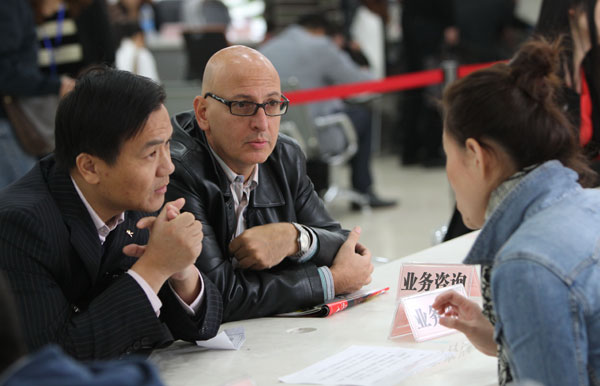

Instead of seeing the China (Shanghai) Pilot Free Trade Zone as a threat, some leading Hong Kong businessmen are beginning to explore the opportunities the experiment offers.
At a conference organized by DBS Bank Ltd on Friday in Hong Kong, a group of bankers, investment experts and law and accounting professionals expressed their views on how the zone will evolve and tried to identify what it will bring to Hong Kong.
Their focus, naturally, was on the financial sector. The blueprint for financial development in the FTZ, announced earlier this week, was widely considered to be bolder than expected. But the details are still too sketchy to provide a firm basis for assessment, the experts said.
|
 Businessmen consult the procedures of company registration in China (Shanghai) Pilot Free Trade Zone at the service hall of the trade zone on Oct 25. Pei Xin / Xinhua |
Nevertheless, they agreed that the initial stages of development would likely be centered on outbound investment, which they said would have less impact on the domestic economy. As such, Hong Kong and some other financial centers would be well-positioned to offer their services.
"The success of the Shanghai free trade zone is in the best interest of Hong Kong," said Patrick Cheung, a partner at Deloitte China. "Since 1997, Hong Kong has always been in a position to assist the development of the mainland and the city's prosperity depends on that."
"At an early stage, there might be more opportunities for domestic capital to invest overseas instead of foreign funds entering the mainland market," Cheung said.
He added that even though interest rate liberalization is the zone's major task, there are too many stakeholders and regulators involved. Thus, headwinds against reform will likely be strong, he noted.
"But outbound investment is an easier sector for most of the parties to reach consensus," Cheung said. "If a business is focused on assisting China's outbound investment, it might see less barriers to develop in the zone. After all, the zone was set up to benefit the country's real economy."
And the number of registered companies in the zone reflects that trend, said Joseph Chan, partner of Sidley Austin, a law firm based in Shanghai, adding that so far about 1,400 domestic firms have set up shop in the zone, compared with only 38 foreign companies.
"It's obvious that currently the major business in the zone is outbound investment," Chan said.
"It's very encouraging to see the latest PBOC's policy to endorse outbound investment in the zone," Chan said. "In the near future, the window for the renminbi to go abroad will open wider. It's widely believed that within three months to a year, there will be further detailed instructions to interpret the policy."
 Model with modified Audi A5
Model with modified Audi A5
 Model with German luxury cars
Model with German luxury cars
 Getting in the mood
Getting in the mood
 Models at Mercedes pavilion at 2013 Auto Guangzhou
Models at Mercedes pavilion at 2013 Auto Guangzhou
 Buick Riviera concept car at 2013 Auto Guangzhou
Buick Riviera concept car at 2013 Auto Guangzhou
 FAW-VW all-new Golf at Guangzhou auto show
FAW-VW all-new Golf at Guangzhou auto show
 VW donates more than 5k child safety seats
VW donates more than 5k child safety seats
 Honda models at 2013 Guangzhou auto show
Honda models at 2013 Guangzhou auto show